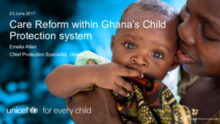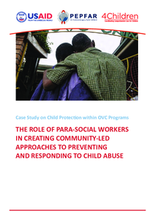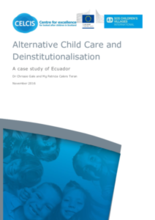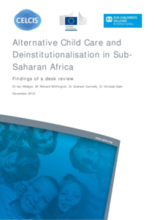Displaying 31 - 40 of 72
This presentation provides an overview of child protection issues and care reform in Ghana.
This paper from the Special Issue on Kinship Care of the Child Welfare Journal discusses a three-phased service model assessed using Family Group Decision Making (FGDM) conferences with informal kinship caregivers and their families.
University at Albany, New York State Kinship Navigator, and the Child Welfare League of America (CWLA) formed a collaborative partnership to plan and host a Kinship Care Summit in Albany, New York in September 2016. The Summit included presentations by authors of kinship manuscripts that were accepted for this Special Issue on Kinship Care of the Child Welfare Journal.
This special issue focuses on the much larger number of kinship caregivers, who either intervene on their own or accept the assistance of child protective authorities that facilitate informal arrangements without taking legal custody.
The purpose of this introduction of the Special Issue on Kinship Care of the Child Welfare Journal is to offer a conceptual framework for addressing the challenges involved in developing a coherent set of policies and practices with respect to kinship care in the US.
The following case study outlines the process undertaken by officials, para-social workers (PSWs) and community leaders in several sub-counties in Kasese District in Western Uganda to a) identify and address instances of child abuse in their communities, b) track cases of abuse and encourage reporting by victims, and c) support a para-social workforce in the communities to act as a deterrent and reduce the incidence of abuse.
This brief summarises key findings of a qualitative study of the family strengthening approach of the Isibindi model.
The European Commission Directorate-General for International Cooperation and Development (DG DEVCO) commissioned SOS Children’s Villages International to undertake case studies of arrangements for ‘alternative child care’ in six non-European countries across three continents to help inform the EU’s future strategy for provision of support for children in countries outside Europe. This report is a case study of one of the six countries, Ecuador.
This desk review provides a brief mapping and summary of existing knowledge on alternative care and deinstitutionalisation in Africa.
This study explores the determinants of child-parent separation and the consequences of existing alternative care arrangements from the perspectives of adults and young people in Laos.




